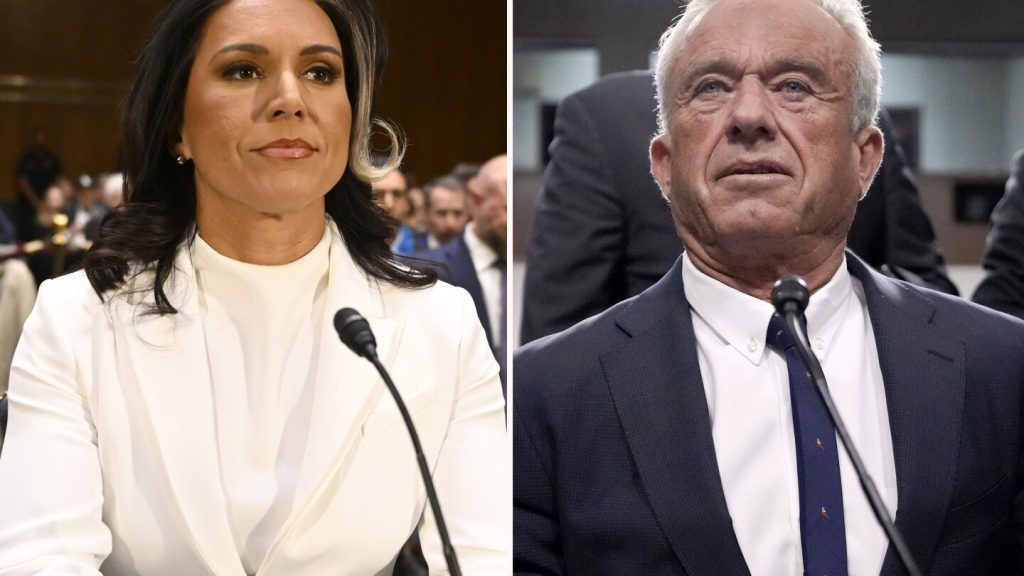The U.S. Senate is on the brink of confirming several of President Donald Trump’s unconventional Cabinet nominees, marking a significant shift in how Republican lawmakers are navigating the president’s unorthodox approach to governance. This week, the full Senate is expected to vote on two of Trump’s most contentious picks: Robert F. Kennedy Jr., nominated to serve as health secretary, and Tulsi Gabbard, selected to lead the Office of the Director of National Intelligence. Both nominees have faced intense scrutiny for their unconventional views and lack of traditional qualifications, yet they have managed to clear key hurdles in the confirmation process. This trend reflects a broader pattern in which Republican senators, despite concerns about Trump’s picks, are increasingly falling in line to support his choices, signaling a willingness to defer to the president’s vision for his administration.
Senate Majority Leader John Thune has been instrumental in pushing these nominations forward, scheduling votes on Gabbard and Kennedy as the Senate’s first priorities this week. Thune’s efforts have been bolstered by Vice President JD Vance, who has played a key role in persuading reluctant Republican senators to support Trump’s nominees. Vance’s behind-the-scenes negotiations, particularly with Senators Bill Cassidy of Louisiana and Todd Young of Indiana, have been crucial in overcoming resistance to Kennedy and Gabbard. Both senators initially expressed strong reservations about the nominees—Cassidy over Kennedy’s vaccine skepticism and Young over Gabbard’s past statements on Russia and Edward Snowden—but ultimately agreed to support their nominations after receiving assurances that the nominees would moderate their views in office.
The confirmation process has been a tumultuous journey, with several nominees facing intense scrutiny for their personal histories and unorthodox perspectives. For instance, Pete Hegseth, Trump’s choice for defense secretary, has already taken office despite allegations of problematic behavior, including claims of drinking and aggressive conduct toward women. Similarly, Kash Patel, Trump’s pick for FBI director, appears to be on track for confirmation, despite concerns about his lack of experience and controversial past actions. These nominees were once seen as the most vulnerable to losing Republican support, but Thune’s optimism about their chances of confirmation reflects the growing willingness of GOP lawmakers to rally behind Trump’s choices, even when they challenge traditional norms.
The dynamics at play in the Senate reveal a profound shift in how Republicans are approaching Trump’s second term. Even the most independent-minded senators, such as Cassidy and Young, have chosen to work with the president rather than risk opposing him. While Trump has largely avoided the public threats and intimidation tactics that marked his first term, his influence over the GOP remains significant. Vance’s role as a mediator has been particularly effective, as he has used his credibility as a former senator to address concerns and broker deals with his former colleagues. This approach has allowed Trump to consolidate power within the federal government, installing loyalists in key positions and reshaping the bureaucracy in his image.
For Democrats, the situation is increasingly dire. With Republicans holding a slim three-seat majority in the Senate, Democrats have limited tools to block Trump’s nominees. They have resorted to procedural delays and extended debates to slow the confirmation process, but these efforts are unlikely to succeed in the face of united Republican support. Senator Richard Blumenthal of Connecticut has expressed hope that these tactics will draw attention to Trump’s expansion of presidential authority and galvanize public outrage, particularly in red states where Republican senators have shown little willingness to defy the president. However, with Trump’s nominees poised for confirmation, Democrats appear to be fighting an uphill battle.
As the Senate moves to confirm these nominees, the implications for Trump’s administration and the federal government are profound. The president’s ability to install loyalists in key positions underscores his continued influence over the GOP and his determination to reshape the government in his image. For Republican lawmakers, the choice to stand by Trump reflects a calculation that aligning with the president is preferable to risking his wrath, even when it means supporting nominees whose views and qualifications have sparked controversy. This dynamic sets the stage for a contentious and transformative period in Washington, as Trump seeks to assert his authority and advance his agenda with the help of his handpicked leadership team.












